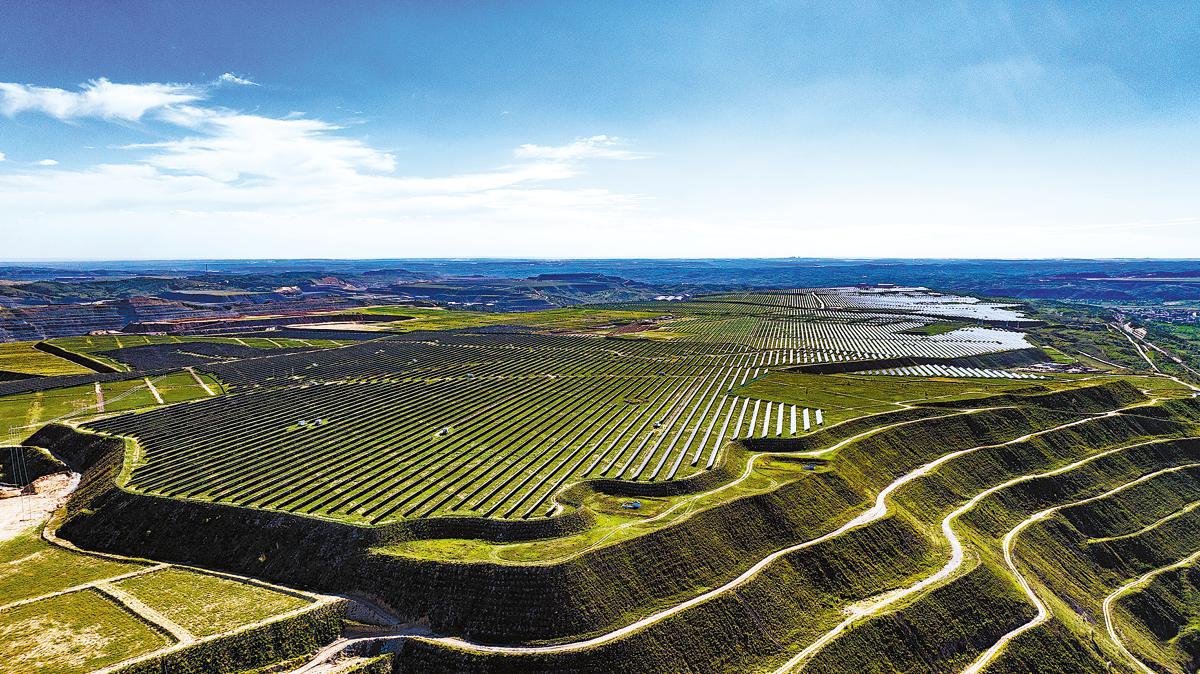
 0 Comment(s)
0 Comment(s) Print
Print E-mail China Daily, April 14, 2025
E-mail China Daily, April 14, 2025
Photovoltaic panels are installed on a reclaimed area of Changxu coal mine in Narisong, Inner Mongolia autonomous region, in August, 2024. [Photo/China Daily]
While renewable energy is playing an increasingly important role in China's green energy transition, coal mining still exists in some areas. In these areas, the government and local industry are taking steps to reduce the environmental impact, improve sustainable development and increase economic gains for local people.
In the coal-mining town of Narisong in the Inner Mongolia autonomous region, locals say that not only is the air quality improving, but their wallets are getting fatter, too.
The town of around 30,000 people has undergone five years of green reforms, which have seen its ecological landscape improve and economic growth increase.
In Narisong's 19 villages and two communities, collectives earned 14.4 million yuan ($2 million) in dividends last year alone, according to Hou Xianming, a member of the town's Party committee and chairman of the town's people's congress.
These dual gains stem from people-centered planning by the local government that started back in 2020. Back then, villages relying solely on mining struggled with unsustainable growth, while those without coal resources lagged behind. To holistically address ecological rehabilitation, sustainable industry development and income disparity, the government brought about the establishment of Juhe Industrial Co, Hou said.
The Juhe enterprise would carry out work associated with mitigating the environmental impact of mining, funded by villages and communities, according to government regulations.
The company also operates across sectors such as mine rehabilitation, environmental cleanup, equipment and land leasing, and waste management, said Hou.
Su Haixia, an official in the Ordos bureau of natural resources, said that mining companies must allocate funds for ecological restoration to local stakeholders. "Taking the green mine construction project as an example, coal companies must establish restoration funds and deposit about 90 million yuan per 10 million tons mined," Su said.
Subject to government evaluations on ecological restoration, coal mining companies could handle the restoration work themselves, or outsource such projects to specialized contractors like Juhe Industrial Co. With professional teams and flexible local hiring, these collaborations have facilitated the reclamation of almost 10,000 hectares of land in the town, according to Hou.
To date, Narisong has established 14 green mines — those that implement eco-friendly practices and technologies to reduce their environmental impact, with additional sites currently under evaluation, Hou said.
Juhe Industrial Co has also created 198 stable jobs for local people in property services alone, boosting the average annual income by nearly 40,000 yuan for those people, according to Hou.
"I was previously working in long-haul transportation far from home, but now I've been able to secure a job in my hometown, earning over 5,000 yuan a month with social security benefits — an opportunity I wholeheartedly cherish," said Liu Meijun, a truck driver from Yangshita village in Narisong.
Senior residents have also benefited. "Some villagers in their early 60s remain physically robust and mentally sharp and still seek employment, but urban companies reject them mainly based on age concerns," said Hou. "However, we've chosen to hire them for suitable light work — enabling them to care for elderly parents at home while earning an income, a win-win for families and the community."
Last year, Juhe Industrial Co generated 200 million yuan in revenue with a net profit of 36 million yuan. A total of 10 percent of those profits go toward emergency assistance for residents affected by natural disasters or severe medical hardships, 40 percent go to village collective dividends and 50 percent for the company's future development, according to Hou.
On the land that has been revitalized and recovered, solar farms are being set up, as well as medicinal herb cultivation.
A 1.95-billion-yuan 400-megawatt solar project has been established by Man Shi Group and Hanxia New Energy in Narisong. Occupying 652 hectares, the project leases 521 hectares from Wutumen village and 130 hectares from Wutugou village at 3,000 yuan per hectare, offering annual incomes of 1.56 million yuan and 390,600 yuan, respectively, for these communities.
These new industries have generated around 500 local employment opportunities, according to Hou.
"I work in the reclaimed area of Changxu coal mine, mainly maintaining and inspecting solar panels. After deductions for social security, I earn over 4,000 yuan a month. I also earn steady rental income from leasing my land to the companies — life keeps getting better and better," said Nie Jianjun, a villager from Wutumen village in Narisong.
Guided by government initiatives, villagers are enjoying diversified income streams ranging from collective equity dividends and wages to land rental money. Moreover, companies purchase saplings cultivated by locals for their land restoration efforts, with the profits from these sales further bolstering the community's financial well-being, Hou added.
Go to Forum >>0 Comment(s)